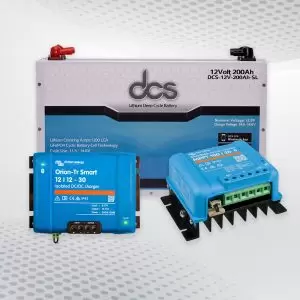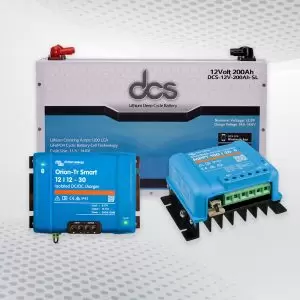A good deep-cycle battery can be a game changer when powering your off-grid adventures or providing backup power during emergencies. These batteries are designed to deliver consistent and reliable performance, making them a popular choice for various applications. From powering motorhomes and boats to serving as a backup power source for solar systems, deep-cycle batteries have proven their worth time and time again. But what makes a Good Deep Cycle Battery truly good? This blog post will explore the key features of a quality deep-cycle battery and how it can unleash its full potential in various settings.
Understanding the Basics of Deep Cycle Batteries
Deep cycle batteries are distinct from their shallow cycle counterparts due to their ability to be discharged significantly to their capacity without incurring damage. At the core, these batteries are engineered to provide a steady current over prolonged periods, unlike starter batteries, designed to deliver a high recent burst for a short duration. This characteristic makes deep-cycle batteries ideal for applications requiring sustained power output, such as solar energy systems or electric vehicles.
Though variants such as lithium-ion are increasingly prevalent, they are typically constructed using lead-acid technology; these batteries are defined by their thick, solid plates, which enable repeated deep discharge cycles. The efficiency and longevity of a deep-cycle battery are significantly influenced by its depth of discharge, cycle life, and the technology employed in its construction. Understanding these foundational aspects is crucial for anyone looking to harness the full potential of deep cycle batteries in their specific application.
The Unique Advantages of DCS Batteries
DCS-Batteries carve a niche in the deep cycle market thanks to their innovative construction and the utilization of superior materials. These batteries boast an exceptional degree of efficiency and durability, making them well-suited to a variety of challenging environments. A distinctive feature of DCS Batteries is their resilience against the rigours of frequent and deep discharges, ensuring minimal wear and tear. This robustness is complemented by remarkably low self-discharge rates, allowing for prolonged storage periods without significant loss of charge.
This aspect is particularly beneficial for applications that are seasonal or intermittent. Moreover, the eco-friendliness and recyclability of DCS-Batteries align with contemporary calls for sustainable energy practices, setting them apart as a conscientious choice for powering the future. Their unique blend of longevity, reliability, and environmental responsibility positions DCS-Batteries as an outstanding option for anyone seeking to invest in top-tier energy storage solutions.
 Choosing the Right Deep Cycle Battery for Your Needs
Choosing the Right Deep Cycle Battery for Your Needs
Navigating the selection process of a deep cycle battery necessitates a thoughtful examination of several pivotal considerations. Paramount among these is the battery’s capacity, typically denoted in ampere-hours (Ah), which indicates the quantum of energy it can store and dispense over a given duration. Equally crucial is ensuring the battery’s voltage aligns seamlessly with the system intended to power it to avoid any compromise in performance.
Additionally, the physical dimensions and weight of the battery must be factored into the equation, particularly in scenarios where space constraints or the need for mobility play a decisive role. Delving into the specific demands of the application further refines the selection process, whether it be for renewable energy storage, powering electric vehicles, or other sustained uses. Making an informed choice by considering these aspects facilitates the procurement of a deep cycle battery that not only meets but possibly exceeds the expectations of its application, thereby optimising both efficacy and cost-efficiency.
Best Practices for Deep Cycle Battery Maintenance
Ensuring a deep-cycle battery’s long-term health and optimal functioning necessitates a commitment to regular maintenance routines. It is vital to periodically check the battery’s charge status, avoiding the pitfalls of allowing the battery to a state of deep discharge state batteries that require it, such as certain lead-acid types; it is imperative to keep the electrolyte levels within recommended parameters. The cleanliness and security of connections cannot be overstated; terminals should be kept free from corrosion and tightly secured to prevent loss of power and potential damage.
Storing the battery in an environment that is both cool and devoid of dampness will aid in preserving its integrity. Routine recharging cycles, especially during infrequent use, will markedly extend the battery’s lifespan. These measures, while simple, play a crucial role in sustaining the performance and reliability of deep-cycle batteries, ensuring they remain a dependable source of power for their intended applications.
The Role of DCS-Batteries in Renewable Energy Systems
The capacity for efficient energy storage and management is paramount in renewable energy installations, such as those powered by solar or wind. DCS-Batteries excel in this arena, their design allowing for the absorption and release of power in alignment with the fluctuating nature of these energy sources. Their superior deep discharge capabilities ensure that energy captured during peak production times is not wasted but stored for future use, particularly when energy generation is lower.
This function is crucial for maintaining a consistent energy supply and reducing reliance on non-renewable power sources. Additionally, the high efficiency of DCS-Batteries enhances the overall output of renewable energy systems, making them more viable and cost-effective solutions for both small-scale and large-scale energy needs. Their durability and low maintenance requirements further solidify their role as a critical component in the push towards sustainable energy solutions, supporting the transition to a greener, more resilient power grid.
Innovations and Future Trends in Deep Cycle Battery Technology
Deep-cycle Deep battery technology is on the cusp of transformative developments, propelled by significant strides in materials science and engineering. Innovators increasingly focus on crafting batteries with vastly improved energy densities, enabling more power storage in comparably sized units. This progress is expected to extend the operational lifespan of batteries significantly, making them an even more appealing option for a wide range of applications. Concurrently, enhancements in battery management systems are set to offer superior performance monitoring and safety features, ensuring that batteries operate within optimal parameters, thus mitigating risks and enhancing efficiency.
Another notable trend is the drive towards sustainability, with research dedicated to discovering greener materials and more eco-conscious production techniques. These advances aim to bolster deep-cycle batteries’ environmental credentials and reduce the carbon footprint associated with their manufacture. As the industry moves forward, these innovations promise to further cement the status of deep-cycle batteries as a cornerstone of modern energy solutions, driving along the dual imperatives of enhanced performance and sustainability.
Overcoming Common Challenges with Deep Cycle Batteries
Though robust and versatile, deep-cycle batteries are challenging, significant hurdles include efficiency losses during high discharge rates and diminished performance in extreme temperatures. To address these concerns, continuous innovation and improvement in battery technology are crucial. Advances in the composition and architecture of these batteries are paving the way for models that are more resilient to such challenges. Enhanced materials that better withstand high discharge rates and more efficient thermal management systems are being developed to ensure optimal performance, regardless of the operating environment.
Additionally, selecting the appropriate battery size and configuration for specific applications is pivotal in mitigating potential inefficiencies and extending the battery’s useful life. By adopting these measures, users can significantly enhance deep-cycle batteries’ operational reliability and efficiency, thereby maximising their potential across various applications.
Case Studies: Success Stories of DCS Battery Implementation
Globally, the implementation of DCS-Batteries has underlined their adaptability and efficiency in many projects, serving as a testament to their robustness. In the arid landscapes of Africa, these batteries have become the backbone of solar-powered educational facilities, enabling uninterrupted learning experiences despite the absence of conventional power grids. Meanwhile, in the rugged terrains of Australia, off-grid homes rely on the steadfast power of DCS-Batteries to sustain daily life, affirming their crucial role in enhancing energy self-sufficiency.
These examples illuminate the practical applications of DCS Battery and highlight their contribution towards fostering sustainability and autonomy in energy consumption. Through these engagements, DCS-Batteries have showcased their capability to operate under varied and challenging conditions, reinforcing their reputation as a reliable energy source for innovative and eco-conscious solutions worldwide.
Conclusion: The Bright Future of Deep Cycle Battery Technology
As society progresses towards greener and more efficient energy frameworks, deep cycle batteries, particularly those crafted by DCS, stand at the forefront of this transition. Their unmatched ability to deliver sustained power makes them indispensable across diverse sectors. With innovations continually emerging, these batteries are poised for greater utility and environmental compatibility. Advancements in material science and sustainable manufacturing processes promise to enhance the ecological footprint of these essential components, driving the energy sector towards a more sustainable future.
The evolution of deep cycle battery technology, underscored by DCS’s commitment to excellence, is enhancing energy storage solutions and redefining the parameters of what’s possible in renewable energy utilization and efficiency. This trajectory highlights a future where deep-cycle batteries become even more integral to our energy systems, contributing significantly to achieving global sustainability goals.
Maximising the Lifespan of Your Deep Cycle Battery
Achieving the greatest possible service life from a deep-cycle battery requires adherence to maintenance and care guidelines. Key amongst these is the routine observation of charge states, ensuring the battery is neither overcharged nor allowed to discharge excessively. Periodic checks are essential to maintain the battery within its optimal charge parameters. Additionally, it is imperative to keep the battery in a cool setting that avoids extremes of temperature, as these can significantly impact battery life and performance.
Ensuring the cleanliness and tightness of connections also prevents power loss and potential damage, contributing to the battery’s longevity. By embracing these practices, individuals can significantly extend the operational life of their deep cycle batteries, thereby extracting maximum value from their investment and guaranteeing continued high performance and dependability from their energy storage solutions.
FAQS
1. What distinguishes a Good Deep Cycle Battery from a regular battery?
Good Deep Cycle Battery are designed for prolonged discharges and to use most of their capacity, unlike regular or starting batteries, which provide short bursts of high energy primarily for starting engines.
2. How do I know which deep cycle battery capacity is right for me?
Assess the energy consumption of your devices or systems and consider a battery that exceeds your calculated needs by at least 20% to accommodate inefficiencies and ensure longevity.
3. Can DCS-Batteries be used with solar panels?
Yes, DCS-Batteries are an excellent match for solar panels because they can handle deep discharge cycles, making them ideal for storing solar energy for later use.
4. What maintenance do deep cycle batteries require?
While maintenance varies by type, general practices include keeping them charged, ensuring terminals are clean and secure, and checking fluid levels for those that are not sealed.
5. How long can I expect my deep cycle battery to last?
The lifespan depends on usage, maintenance, and discharge cycles, but a well-maintained deep cycle battery can last between 4 to 7 years or longer with proper care.
Conclusion
In summarizing, the journey through the world of Good Deep Cycle Battery, particularly focusing on the prowess of DCS-Batteries, illustrates a landscape brimming with innovation and promise. As they’ve explored, these batteries are not just a cornerstone for off-grid and renewable energy systems but a pivotal element in our collective shift towards more sustainable and efficient energy usage. The continual technological advancements and the steadfast commitment to improving performance and sustainability herald a bright future for deep-cycle batteries. For those invested in enhancing their energy solutions, the insights provided underscore the importance of selecting the right battery.
| Other Good Articles to Read |
| Niche Blogs Connect |
| Blogs 97 |
| Blog Stitution |
| Blogs Unplugged |
| Blogs Cotch Rouge |
| Blog Signatr |
| Blog Sintonias |
| Blog Zilla |
| Consumer Forums |
| Finance Forums |
| G Blogs |
| Too Blog |
| Related Business Listings |
| Contact Directory |
| Local Business Profiles |



